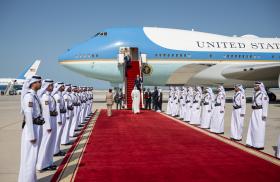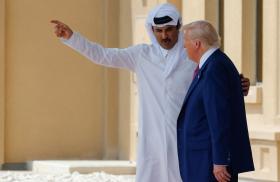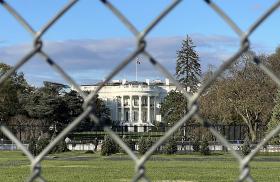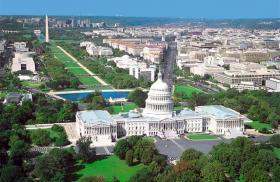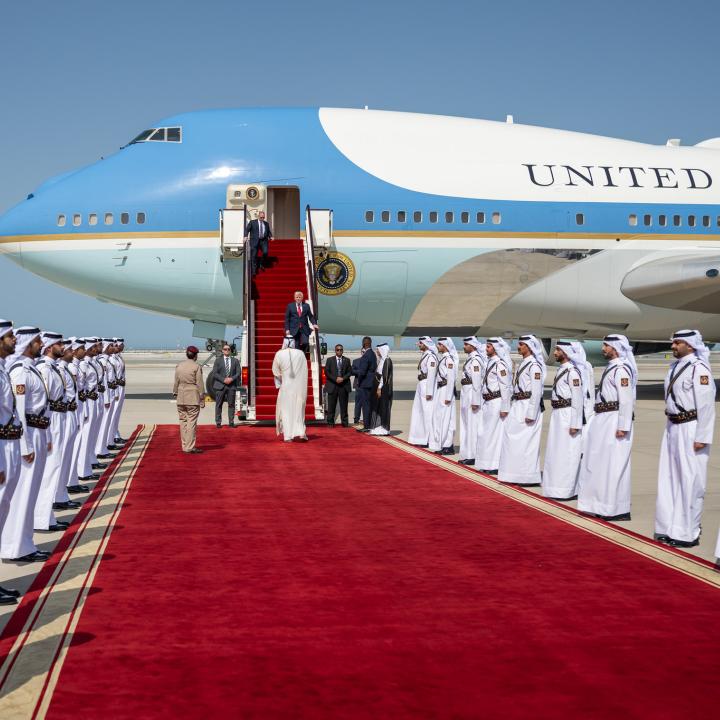
- Policy Analysis
- Interviews & Presentations
President Trump's Gulf Trip: A Whirlwind Three Days in the Region

Part of a series: President Trump's 2025 Gulf Trip
or see Part 1: President Trump's Gulf Trip: Previewing the Agenda
In this final of several daily videos from Washington Institute scholars, Robert Satloff summarizes the economic, diplomatic, and cultural implications of President Trump's May 2025 trip to the Gulf region.
He came. He saw. He cashed in. That sums up President Trump’s visit to the Gulf. Don’t focus too closely on the actual numbers—it’s the imagery that was unmistakable. This was Donald Trump in his element, visiting princes and potentates and celebrating the signing of huge contracts that validate the president’s mercantilist economic strategy. Throughout, he seemed to relish breaking new ground.
On Syria, virtually all his advisors counseled for a cautious, incrementalist approach, but the president listened instead to the unlikely duo of Saudi Crown Prince Muhammad bin Salman and Turkish President Recep Tayyip Erdogan and ordered a full cessation of sanctions.
On Qatar, he dispensed with criticism of its coziness to Hamas and problematic funding of American universities by personally visiting al-Udeid Air Base, signaling that the military partnership is firm, the base is not moving, and nothing will get in the way of business.
On Iran, the president had a mixed message. He did not publicly affirm his call to dismantle Tehran’s enrichment program but said he supported the demand that Iran end support to its regional proxies. He also seemed to take the prospect of military force off the table by only threatening a return to maximum pressure; this must have been a relief to the ayatollahs, who fear a U.S. attack but have years of experience making their people survive U.S. economic sanctions.
Throughout, Israel—not on his itinerary—appeared to be more bystander than “in the room where it happened.” The war in Gaza seemed to play less of a role than one might have imagined, as did the idea of expanding the Abraham Accords. Early talk was that the United States would push for a Gaza ceasefire before the trip; it is unclear whether there will even be a strong push for one now, with the president only noting he would take care of humanitarian concerns there.
The cultural side of the trip was fascinating. In the UAE, the president visited a mosque, a step heavy in symbolism. A grandfather to observant Jewish grandchildren, he also visited a synagogue in Abu Dhabi, part of the Abrahamic Family House. In Saudi Arabia, home to Mecca and Medina, the president was hosted at Dariyah, the home of Saudi nationalist spirit where there is scant mention of the kingdom’s Islamic roots.
What’s the long-term impact of the trip? For me, the key is what it says about the Gulf. It was just a blink in historical time that these countries were technological backwaters. Who would have thought that they—not Singapore, not Taiwan—now sit at the cutting edge of the most transformative technology of our era, artificial intelligence. How this will impact these still heavily traditional societies is one of the great social-cultural questions facing the Middle East today.

